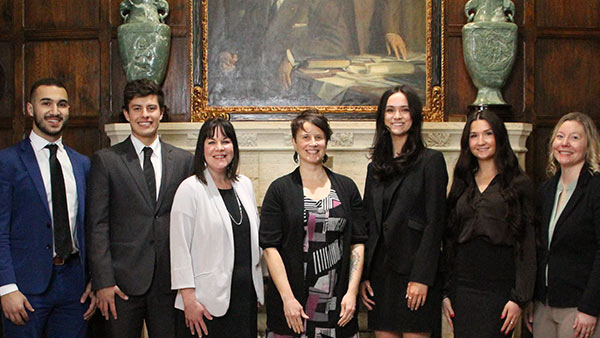October 3, 2024
Saints step up: Exploring medical entrepreneurship with Innovation Scholars
Working at the intersection of science, healthcare and entrepreneurship, four St. Scholastica students — Fabian Andrade ’25, Greta Kos ’24, Jad Saouma ’24 and Sarah Vlasich ’24 — collaborated as the College’s inaugural Innovation Scholars team. Together, the team spent four months researching a challenging tech transfer project focusing on ways to predict resistance to cancer-treating drugs in chemotherapy before proposing a solution to healthcare professionals at the Mayo Clinic.
A nationally recognized experiential learning program, Innovation Scholars immerses teams of liberal arts students in the complex processes of translational medicine while shaping a solution to a real-life issue. Since 2006, more than 900 Minnesota private college and university students have put their research, problem-solving, collaboration and communication skills to the test as they develop and pitch original ideas to teams at Mayo Clinic and early-stage Medical Alley companies.
Dr. Brenda Fischer, dean of the Stender School of Leadership, Business and Professional Studies, is glad to support the program for Saints. “The Stender School is delighted to sponsor the Innovation Scholars program as a unique, high-impact experiential learning opportunity,” she said. “We have an incredibly talented interdisciplinary team of students and faculty from business and the sciences. Students gain knowledge, experience and confidence as they work with their team and healthcare professionals.”
A challenging collaboration
This past year, the project objective was to explore how a new biomarker could direct treatment strategies for one of the deadliest types of cancer. “Pancreatic ductal adenocarcinoma (PDAC) is one of the most lethal cancers worldwide with a five-year survival rate of less than 10%,” explained Saouma. “This form of pancreatic cancer is associated with a poor prognosis due to a lack of early detection methods and nearly unavoidable chemoresistance. Dr. Tongzheng Liu and colleagues discovered and patented a protein as a biomarker used to guide chemotherapy-related treatment(s) of PDAC. Our job was to analyze this protein and try to prove how efficient it could be from the biology side and on the business side we were responsible for doing a demographic and financial study as well as exploring potential partnerships.”
Contributing to a project with the possibility of real-time, real-world impact was both exciting and challenging. In order to be effective, the team needed to absorb and sort through data in unfamiliar fields while communicating efficiently and effectively to meet the presentation deadlines. Dr. Melanie Talaga, associate professor, director of the Chemistry MS and one of the project mentors, enjoyed supporting the students’ efforts. “As a scientist, it is very challenging to explain my science to non-scientists; practice and exposure to develop this skill is helpful and meaningful. The design of this program gives students exposure to this early in their education and is helpful for them to build these skills,” she said. “Mentoring students in this program was a fun experience. It was great to see them work together and independently as well as realize when they needed guidance from a mentor. It can be difficult to know when and what to ask your mentors, so this was fun to watch unfold.”
Expanding horizons
Vlasich shared how the Innovation Scholars experience gave her a deeper appreciation of the contribution she could make to a critical research area. “Prior to being a part of this team, I had been fascinated by cancer research and intrigued by ways that it could be accessible to undergraduates like me,” she explained. “Mayo Clinic’s Innovation Scholars program gave me the opportunity to deeply engage with the science, which was both an exhilarating and transformative experience.”
Saouma was excited about the “once-in-a-lifetime opportunity” through the Innovation Scholars program. “It’s a chance to contribute to important research at the world’s best hospital, Mayo Clinic, aiming to ease people’s suffering,” he said. “This experience was incredibly beneficial for my career, exposing me to various new fields in healthcare, marketing, business and technology. What really makes me proud to be part of this program is the chance to make a difference, no matter how small, in improving people’s lives.”
Making a positive impact
“So far it has been one of the best experiences in my life,” Andrade shared. “The main reason I decided to apply for the project is because of the chance to work on the development of a medical product that has the potential to help millions of people means so much for me. One of my goals in life is to make a positive impact and contribute to people’s happiness.”
Vlasich saw how the months of hard work outside the classroom culminated in a unique opportunity that was well worth it. “Do it!” Vlasich enthused. “The project is very challenging and will push you to your limits, but you will not regret it for one minute of your life. This is such an incredible opportunity, and I really hope that future St. Scholastica students are as excited as we were to be a part of it.”

2023-2024 Innovation Scholars
- Fabian Andrade ’25 (business management and computer science; data analytics minor)
- Greta Kos ’24 (biology, pre-PA; psychology and sociology minors)
- Jad Saouma ’24 (computer information systems)
- Sarah Vlasich ’24 (biochemistry and psychology; pre-med)
The team’s campus mentors included: Amber Schlater, Jenean O’Brien, Melissa Goodson, Melanie Talaga, and Amy Pocrnich and the team was led by Augsburg University MBA student Andy Thomson.

